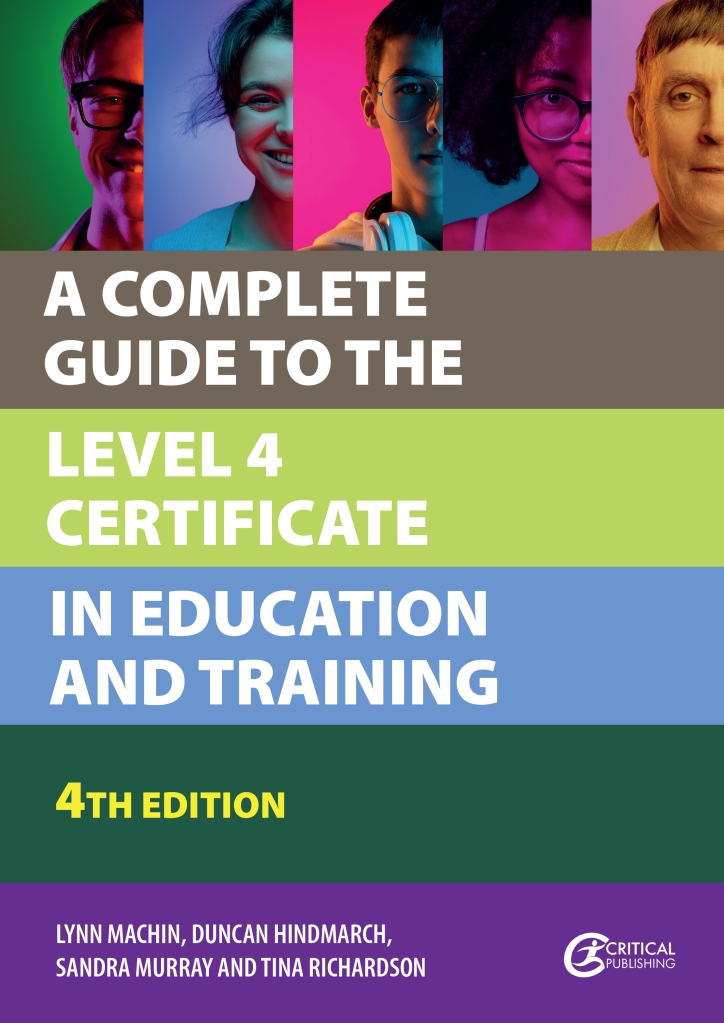This extract comes from the fourth edition of our best-selling text A Complete Guide to the Level 4 Certificate in Education and Teaching by Lynn Machin, Duncan Hindmarch, Sandra Murray and Tina Richardson.
PROFESSIONALISM: UNDERSTANDING ROLES AND
RESPONSIBILITIES IN EDUCATION AND TRAININGWhat are your roles as a teacher?
As a teacher, one of your main roles is to motivate your learners to develop their ability and aspiration to learn. You may read about delivering training and facilitating learning, but in reality, you do much more than that. Your role is not just about teaching your subject or preparing learners for assessment. The focus of your role relates very much to inspiring your learners to change and develop their personal, social and professional skills to the best of their ability. In this respect, your ultimate aim is to enable your learners to understand how to take responsibility for their own development. You can do
this by planning and preparing teaching and learning activities that take account of the needs and well-being of individual learners as well as groups of learners.
Some key aspects of your role as a teacher may be:○ developing expertise in your field by keeping up to date with the latest developments in your subject area;
○ carrying out initial and/or diagnostic assessments;
○ clear communication with your learners, other professionals and stakeholders;
○ promoting appropriate behaviour and respect for others;
○ identifying and meeting individual learners’ needs;
○ being aware of the support services available;
○ being organised;
○ being reflective, by learning from successes as well as mistakes.
What are your responsibilities as a teacher?
As a teacher, a primary responsibility is to ensure that learners are enrolled on the correct course, in terms of meeting their needs, abilities and aspirations. Further to this, you need to ensure they are on the appropriate course in terms of compliance with award and organisational requirements. You will therefore probably have responsibility for the following:○ promoting a safe and supportive learning environment;
○ promoting inclusion, equality and diversity;
○ adhering to key legislation, regulatory requirements and codes of practice;
○ modelling professional behaviour at all times to inspire your learners;
○ taking responsibility for your own professional development;
○ working with colleagues and external stakeholders to improve the experience and achievement of your learners;
○ designing or contributing to the design of the course curriculum;
○ negotiating appropriate learning targets for the group and individuals as appropriate to their needs, aspirations and course aims;
○ planning learning activities based on the needs of your group and specific individual needs within the group;
○ designing or amending learning resources that are varied, appropriate to the award aims and challenging for your learners;
○ keeping accurate and legally compliant records to contribute to your organisation’s quality improvement strategy. This will include your group’s recruitment, retention, achievement and progression data, as well as evaluation of how performance can be improved;
○ keeping accurate records of individual learners’ progress and future needs. This is often referred to as an individual learning plan;
○ providing learners with appropriate points of referral as required.With regard to this last point, your primary aim is to enable each learner to achieve to the best of their ability through working in a safe and supportive environment. It is therefore your responsibility to know who should be contacted if they need any additional support or specialist information, such as for finance, health, study skills or counselling issues.
What are your rights as a teacher?
Your rights as a teacher will be set out in your employment contract. Your employer will also be subject to the Equality Act 2010, meaning that you should not be subject to discrimination, harassment or victimisation. Your organisation is likely to have a recognised trade union, such as the University and College Union (UCU, 2023) or National Education Union (NEU, 2023), that provides advice and guidance on contracts and rights.
Find out more about A Complete Guide to the Level 4 Certificate in Education and Teaching by Lynn Machin, Duncan Hindmarch, Sandra Murray and Tina Richardson at our website www.criticalpublishing.com.

Available in Paperback, EPUB, PDF, and on Kindle
ISBN : 9781915713544
4th Edition, 230 pp
Jan 2024
Helpful
Thank you, this has been a great help in getting me started on the L3 ET online course.
amazing really helpfull
thank you so much, really helped
kindly discuss the understanding of the key role and responsibilities of a teacher with particular reference to meeting individual learner’s need.
Great summary of the key points of roles & responsibilities of teaching. Most helpful when starting my L3 ET course.